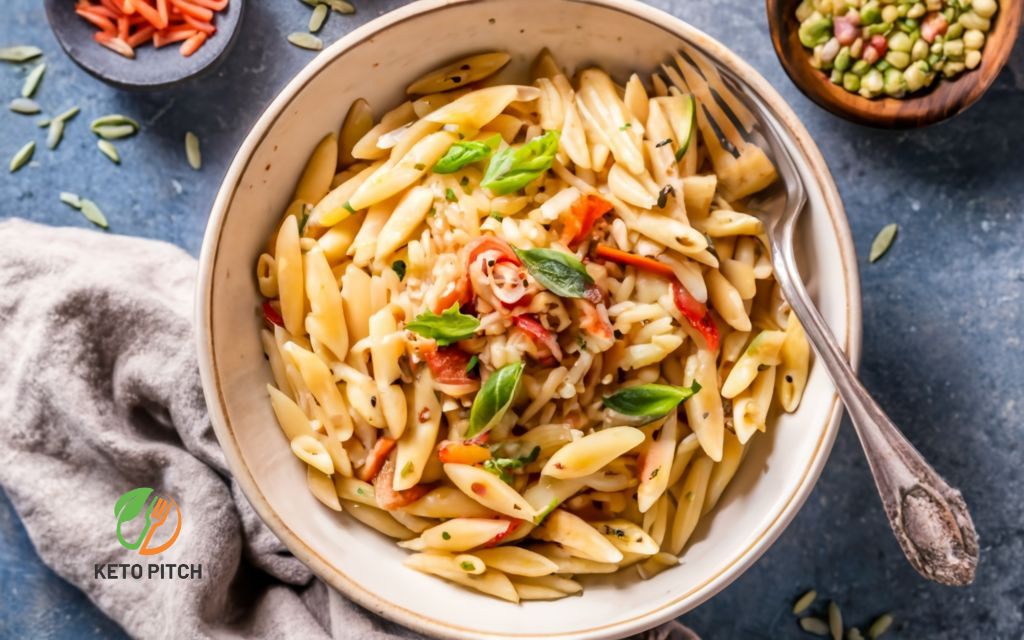The short answer is yes, orzo can be keto friendly when enjoyed in moderation. While orzo is not as low in carbs as some other pasta alternatives, its mild flavor makes it an appealing option for keto dieters looking to satisfy pasta cravings.
What is Orzo?
Orzo, also called rishiki or rice pasta, is a form of short-cut pasta shaped like large grains of rice. The popular Italian pasta gets its name from the Italian word for barley – “orzo” – which its shape resembles.
Some key facts about orzo:
- Made from wheat flour
- Contains 5-7g of net carbs per 1/2 cup uncooked
- Mild in flavor with a chewy, rice-like texture
- Ideal for salads, soups, casseroles, stir fries
- Often used in place of rice in dishes
Is Orzo Keto? Nutrition Facts
While orzo is relatively higher in net carbs than true keto staples like cauliflower or zucchini noodles, it can fit into a keto lifestyle in moderation.
Here are the nutrition facts for a 1/2 cup uncooked serving of orzo:
- 110 calories
- 5-7g net carbs
- 4g protein
- 0g fat
The moderate carb count allows small portions of orzo to stay within keto macros, though individuals’ limits will vary based on their specific goals. Those strictly keeping carbs under 20g may need to minimize intake.
Benefits of Choosing Orzo on Keto
Orzo can be an excellent occasional pasta substitute for keto and low-carb dieters when used wisely. Benefits include:
Satisfies Cravings
The pasta-like texture and neutral flavor of orzo make it perfect for satisfying Italian food cravings on keto. Using it in dishes like shrimp scampi or chicken parmesan can ease the transition into very low-carb eating.
Easy to Swap In
Since orzo mimics the texture of rice or couscous, it can easily be swapped into a variety of dishes without significantly altering flavor or preparation. This versatility makes it an effortless way to cut back on carbs.
More Filling Than Other Pastas
Thanks to its rice-like chew, orzo offers more mouthfeel and takes longer to eat than traditional noodles or smaller pastas. This increased satiety can curb overeating.
Adds Variety
Orzo supplies welcome variety to keto meal plans dominated by low-carb veggies and meats. An orzo-based salad or stir fry can offer a refreshing change of pace.
Is Orzo Keto-Friendly? How to Work It In
When consumed mindfully in place of higher carb options, orzo can absolutely complement a ketogenic diet. Here’s how to make it work:
- Watch portions – Stick to 1/4-1/2 cup uncooked max per serving
- Pair with fat and protein – Serve orzo with fatty ingredients like olive oil, cheese, or salmon to slow digestion
- Count net carbs – Account for orzo’s carbs within daily keto targets
- Use sparingly – Save orzo for occasional meals rather than regular pasta replacement
Following these tips will allow you to incorporate orzo as a substitute for rice, noodles, or other grains without getting kicked out of ketosis.
Keto-Friendly Orzo Recipes
Here are some delicious keto orzo recipes to enjoy infrequently when a pasta fix strikes:
Easy Cheesy Tuna Orzo
- 1/2 cup orzo
- 1 can tuna
- 1/2 cup cheddar
- 1/4 cup mayo
- Salt and pepper
Mix ingredients, bake at 350° until hot and bubbly.
Mediterranean Orzo Salad
- 1/2 cup cooked orzo
- 1 cucumber, chopped
- 1 tomato, diced
- 1/2 red onion, thinly sliced
- 1/2 cup Greek olives
- Feta cheese
- Red wine vinegar
- Olive oil
- Oregano
Toss all ingredients, chill 1-2 hours before serving.
Creamy Orzo Chicken Soup
- 4 cups chicken broth
- 1/2 cup orzo
- 2 cups cooked, shredded chicken
- 2 cups chopped spinach
- 1/4 cup heavy cream
- Salt and pepper
Simmer orzo in broth 8 minutes, stir in chicken and spinach until warm, remove from heat and stir in heavy cream.
The Verdict: Yes, Orzo Can Be Keto!
When used properly in place of higher carb options like rice, bread, and regular pasta, orzo can absolutely be included on a keto diet. Small servings a couple times a week should not disrupt ketosis.
Moderating portions, pairing with fat and protein, counting net carbs, and not overusing it are key to balancing orzo with keto goals. Follow the recommendations in this article to safely enjoy orzo and all its versatile, pasta-like glory without getting kicked out of ketosis.








